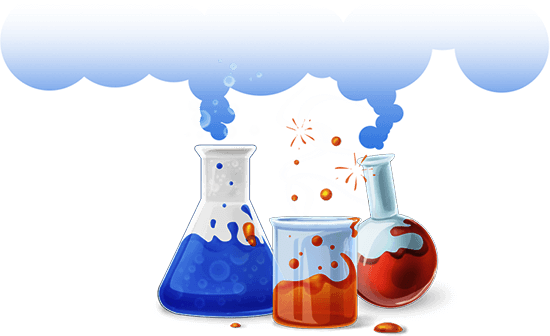Chemistry is the study of matter and energy and the interaction between them. There are many reasons to study chemistry, even if you aren't pursuing a career in science.
Chemistry is everywhere in the world around you! It's in the food you eat, clothes you wear, water you drink, medicines, air, cleaners... you name it. Chemistry sometimes is called the "central science" because it connects other sciences to each other, such as biology, physics, geology, and environmental science. Here are some of the best reasons to study chemistry.
1. Chemistry helps you to understand the world around you. Why do leaves change color in the fall? Why are plants green? How is cheese made? What is in soap and how does it clean? These are all questions that can be answered by applying chemistry.
2. Basic knowledge of chemistry helps you to read and understand product labels.
3. Chemistry can help you make informed decisions. Will a product work as advertised or is it a scam? If you understand how chemistry works you'll be able to separate reasonable expectations from pure fiction.
4. Chemistry is at the heart of cooking. If you understand the chemical reactions involved in making baked goods rise or neutralizing acidity or thickening sauces, chances are you'll be a better cook.
5. A command of chemistry can help keep you safe! You'll know which household chemicals are dangerous to keep together or mix and which can be used safely.
6. Chemistry teaches useful skills. Because it is a science, learning chemistry means learning how to be objective and how to reason and solve problems.
7. Helps you to understand current events, including news about petroleum, product recalls, pollution, the environment and technological advances.
8. Makes life's little mysteries a little less... mysterious. Chemistry explains how things work.
9. Chemistry opens up career options. There are many careers in chemistry, but even if you're looking for a job in another field, the analytical skills you gained in chemistry are helpful. Chemistry applies to the food industry, retail sales, transportation, art, homemaking... really any type of work you can name.
10. Chemistry is fun! There are lots of interesting chemistry projects you can do using common everyday materials. Chemistry projects don't just go boom. They can glow in the dark, change colours, produces bubbles and change states.

LIST OF APPARATUS IN CHEMISTRY LAB:
- Safety goggles and safety equipment
- Beakers
- Conical flask
- Chemical balances
- Test tubes and test tube stand
- Tongs
- Watch glass
- Funnels
- Droppers
- Spatulas
- Bunsen Burners
Chemistry lab safety rules:
The following are rules that relate to almost every laboratory and should be included in most safety policies. They cover what you should know in the event of an emergency, proper signage, safety equipment, safely using laboratory equipment, and basic common-sense rules.
- Be sure to read all fire alarm and safety signs and follow the instructions in the event of an accident or emergency.
- Ensure you are fully aware of your facility's/building's evacuation procedures.
- Make sure you know where your lab's safety equipment—including first aid kit(s), fire extinguishers, eye wash stations, and safety showers—is located and how to properly use it.
- Know emergency phone numbers to use to call for help in case of an emergency.
- Lab areas containing carcinogens, radioisotopes, biohazards, and lasers should be properly marked with the appropriate warning signs.
- Open flames should never be used in the laboratory unless you have permission from a qualified supervisor.
- Make sure you are aware of where your lab's exits and fire alarms are located.
- An area of 36" diameter must be kept clear at all times around all fire sprinkler heads.
- If there is a fire drill, be sure to turn off all electrical equipment and close all containers.
- Always work in properly-ventilated areas.
- Do not chew gum, drink, or eat while working in the lab.
- Laboratory glassware should never be utilized as food or beverage containers.
- Each time you use glassware, be sure to check it for chips and cracks. Notify your lab supervisor of any damaged glassware so it can be properly disposed of.
- Never use lab equipment that you are not approved or trained by your supervisor to operate.
- If an instrument or piece of equipment fails during use, or isn't operating properly, report the issue to a technician right away. Never try to repair an equipment problem on your own.
- If you are the last person to leave the lab, make sure to lock all the doors and turn off all ignition sources.
- Do not work alone in the lab.
- Never leave an ongoing experiment unattended.
- Never lift any glassware, solutions, or other types of apparatus above eye level.
- Never smell or taste chemicals.
- Do not pipette by mouth.
- Make sure you always follow the proper procedures for disposing lab waste.
- Report all injuries, accidents, and broken equipment or glass right away, even if the incident seems small or unimportant.
- If you have been injured, yell out immediately and as loud as you can to ensure you get help.
- In the event of a chemical splashing into your eye(s) or on your skin, immediately flush the affected area(s) with running water for at least 20 minutes.
- If you notice any unsafe conditions in the lab, let your supervisor know as soon as possible.



